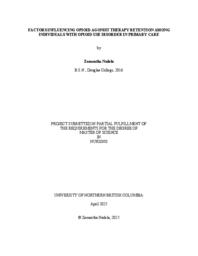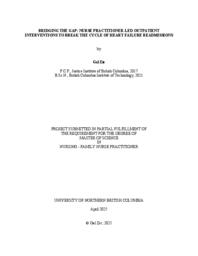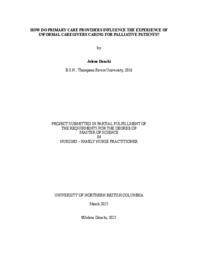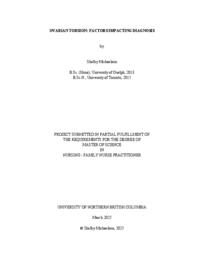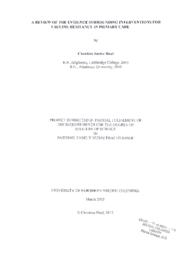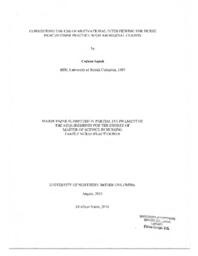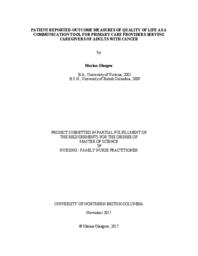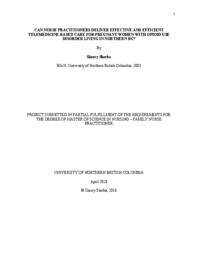Digital Document
The opioid crisis remains a significant public health concern, with fentanyl contributing
to 79% of accidental opioid-related deaths in Canada between January and June 2024, nearly a
40% increase since the national surveillance in 2016. Opioid…
Digital Document
Aim: To explore whether Nurse Practitioner-led outpatient interventions targeting heart failure
patients can reduce hospital readmissions or emergency department visits, thereby improving
healthcare efficiency and demands on hospitals.…
Digital Document
Cervical cancer (CC) remains a major public health concern, disproportionately affecting
low-income populations due to barriers in screening and follow-up care. Inadequate follow-up
after a positive HPV self-sample result puts individuals at…
Digital Document
Background: The increasing complexity of trauma care and provider shortages have led to
the expanded role of nurse practitioners (NPs). While NPs are integrated into various
healthcare settings, their influence on length of stay (LOS) for adult…
Digital Document
Synthesizing the findings from diverse methodologies, this integrative review aimed to
guide nurse practitioners (NPs) in supporting the mental health and wellbeing of Syrian adults
with refugee experiences in Canada (Syrian Adults). A…
Digital Document
This integrative review examines the growing prevalence of depression, a leading
cause of primary care visits in Canada, and the need for accessible treatment options such as
telemedicine. Despite substantial evidence supporting the widespread…
Digital Document
Cervical cancer incidence continues to rise across Canada. Unlike some other cancers,
cervical cancer is largely preventable through a combination of vaccination and routine
screening. Cervical cancer screening was introduced in British Columbia…
Digital Document
Modifiable risk factors for cardiovascular health are often associated with healthy diet,
physical activity, and smoking cessation. Rarely is psychological stress mentioned or attributed
to cardiovascular disease (CVD). However, the literature is…
Digital Document
Background
Primary care providers face challenges when caring for palliative care patients and their
informal caregivers. Many primary care providers have limited understanding and comfort in
providing palliative care. The situation is even more…
Digital Document
The Canadian healthcare system is experiencing significant strain due to a growing and
increasingly complex patient population, coupled with provider shortages. Consequently,
patients are increasingly seeking emergency room care to address their…
Digital Document
Ovarian torsion is a rare gynecological emergency that occurs when the ovary spontaneously
becomes twisted on itself. If not recognized and treated, it can result in tissue necrosis and
loss of the ovary. Ovarian torsion most frequently affects…
Digital Document
Individuals who practice consensual non-monogamy (CNM) face a variety of challenges
in the healthcare system, from administrative barriers to negative comments to overt
discrimination to refusal of care.
It is estimated that up to 20% of adults…
Digital Document
Cancer is a disease of increasing global prevalence, resulting in a rising need for cancer
survivorship care (CSC; World Health Organization [WHO], 2024). While definitions of CSC
vary, primary care providers (PCPs) are increasingly required to…
Digital Document
Human papillomaviruses (HPV) and their associated complications are major public
health issues in Canada and across the globe. There is significant data to support immunization
against HPV in youth as an effective method to prevent the spread of…
Digital Document
Purpose. To identify the factors that influence primary care providers in their decision to
provide medical abortions.
Background. Medical abortion has been commercially available in Canada since 2017, with
reduced restrictions on prescribing…
Digital Document
Shared decision-making (SDM) is central component of patient-centered care and is of
particular interest in contraceptive counselling, where a range of potentially suitable options are
available, and personal preferences and values must guide…

